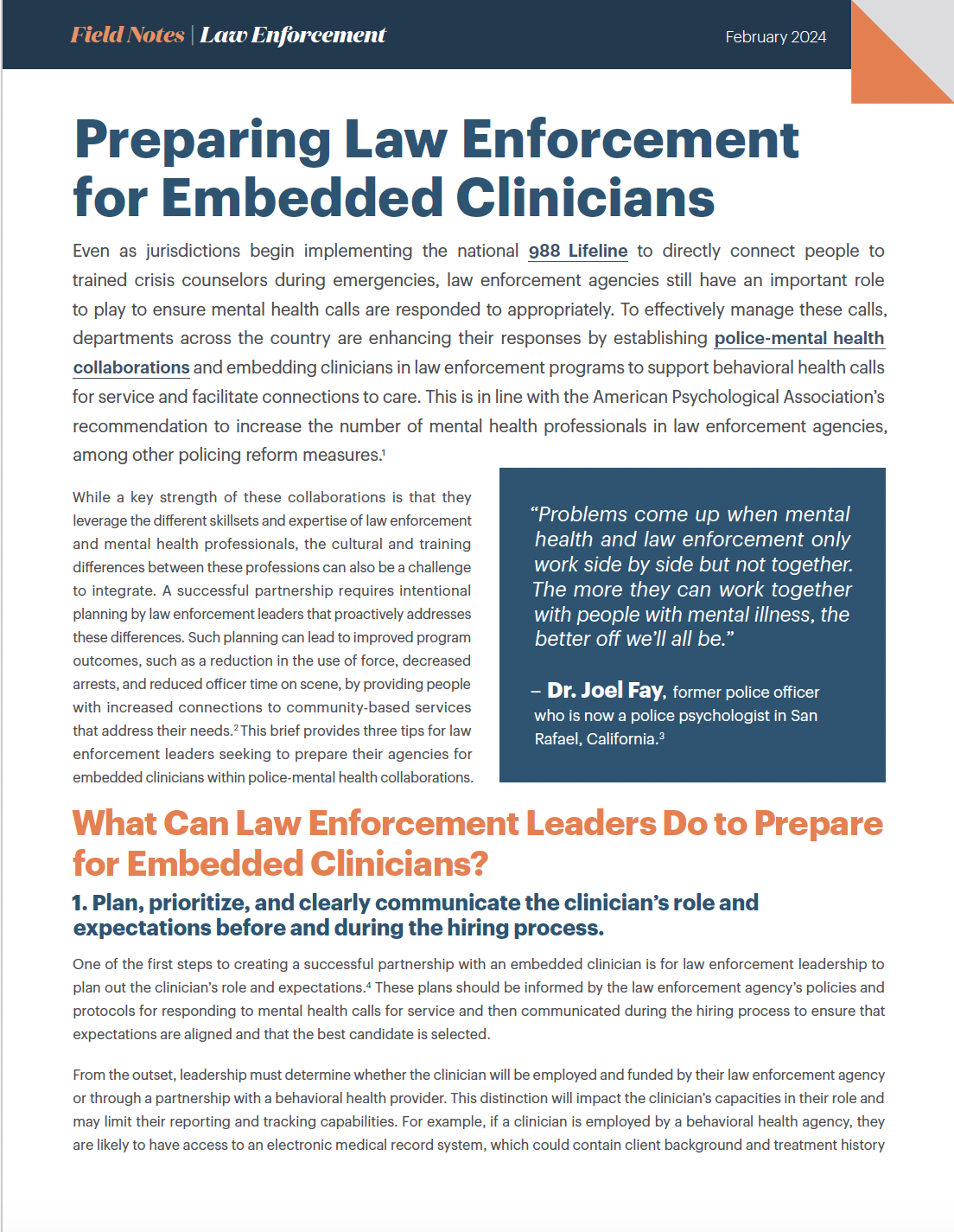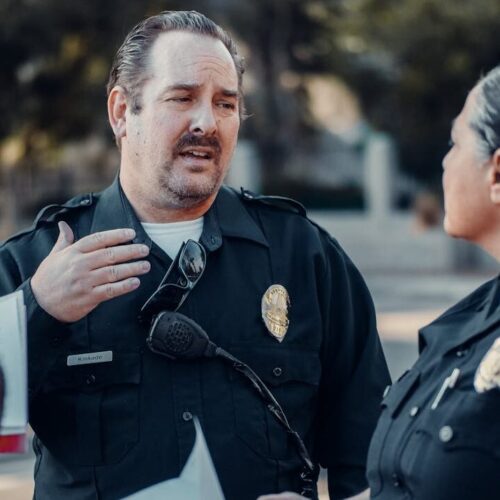Preparing Law Enforcement Agencies for Embedded Clinicians
Even as jurisdictions begin implementing the national 988 Lifeline to directly connect people to trained crisis counselors during emergencies, law enforcement agencies still have an important role to play to ensure mental health calls are responded to appropriately. Departments across the country are enhancing their responses by establishing police-mental health collaborations and embedding clinicians in their programs. This brief provides three tips for law enforcement leaders seeking to prepare their agencies for embedded clinicians and ensure a successful collaboration. Photo credit: Fauxels via Pexels.com
Preparing Law Enforcement Agencies for Embedded Clinicians
Even as jurisdictions begin implementing the national 988 Lifeline to directly connect people to trained crisis counselors during emergencies, law enforcement agencies still have an important role to play to ensure mental health calls are responded to appropriately. To effectively manage these calls, departments across the country are enhancing their responses by establishing police-mental health collaborations and embedding clinicians in law enforcement programs to support behavioral health calls for service and facilitate connections to care. This is in line with the American Psychological Association’s recommendation to increase the number of mental health professionals in law enforcement agencies, among other policing reform measures.1
While a key strength of these collaborations is that they leverage the different skillsets and expertise of law enforcement and mental health professionals, the cultural and training differences between these professions can also be a challenge to integrate. A successful partnership requires intentional planning by law enforcement leaders that proactively addresses these differences. Such planning can lead to improved program outcomes, such as a reduction in the use of force, decreased arrests, and reduced officer time on scene, by providing people with increased connections to community-based services that address their needs.2 This brief provides three tips for law enforcement leaders seeking to prepare their agencies for embedded clinicians within police-mental health collaborations.
What Can Law Enforcement Leaders Do to Prepare for Embedded Clinicians?
1. Plan, prioritize, and clearly communicate the clinician’s role and expectations before and during the hiring process.
One of the first steps to creating a successful partnership with an embedded clinician is for law enforcement leadership to plan out the clinician’s role and expectations.4 These plans should be informed by the law enforcement agency’s policies and protocols for responding to mental health calls for service and then communicated during the hiring process to ensure that expectations are aligned and that the best candidate is selected.
From the outset, leadership must determine whether the clinician will be employed and funded by their law enforcement agency or through a partnership with a behavioral health provider. This distinction will impact the clinician’s capacities in their role and may limit their reporting and tracking capabilities. For example, if a clinician is employed by a behavioral health agency, they are likely to have access to an electronic medical record system, which could contain client background and treatment history information that informs the clinician’s approach in a crisis situation. Law enforcement agencies must also consider whether it is appropriate for clinicians to access their computer-aided dispatch system and records management system or whether applicable information from these databases will be communicated to the clinicians by officers.
Next, when considering the needs of the community and the police-mental health collaboration, leadership will have to assess the importance of certain factors, such as the experience needed to launch or expand the embedded clinician program. An experienced clinician, for example, may offer a wealth of relevant knowledge but also require additional time to recruit and hire due to a smaller pool of qualified candidates and a competitive job market. A less experienced clinician could be quickly onboarded but may lack firsthand expertise to handle certain situations.
Finally, during recruiting and interviewing, the clinician’s role should be explained in a transparent manner that provides a realistic overview of the potential benefits and demands of the role. This hiring strategy will allow applicants to self-select into or out of the role and may lessen the probability of turnover. Another interviewing method that can assist with clinician selection is using role-play scenarios involving real examples of mental health crisis calls to expose the candidate to the demands and expectations of the role in action.
Law enforcement agencies should also create a hiring panel that includes people such as experienced Crisis Intervention Team officers, agency leaders, and mental health professionals who currently have or previously had partnerships with the law enforcement agency. Law enforcement personnel who will work closely with the embedded clinician should also be included to help create interview questions, participate in interviews, provide feedback on the applicant’s ability to meet the expectations of the role, and give additional context to the applicant about the agency’s culture.
2. Train clinicians on call response safety and other relevant protocols to help create a supportive agency culture for both clinicians and law enforcement personnel.
Often, clinicians may have received prior training in roles at non-law enforcement agencies or from their educational programs that differs from how law enforcement officers ensure safety during an on-scene response. However, regardless of whether the hired clinician has prior experience working with law enforcement, it is critically important for the law enforcement agency to provide thorough hands-on training about department-specific policies regarding safety protocols for mental health crisis calls. The agency should also ensure that the clinician is familiarized with department-wide practices through onboarding that can include:
- Attending roll calls;
- Observing safety strategies in action during ride-alongs, review of body-worn camera incident footage, and simulated training scenarios;
- Participating in police academy training or community/citizen police academy; and
- Training about relevant privacy, response, and safety laws.
The manager overseeing the embedded clinician should also conduct frequent check-ins during the first few months as the clinician adjusts to new protocols. Additional discussions about law enforcement agency culture can further assist with onboarding, especially for clinicians who are new to a law enforcement setting. For example, clinicians without law enforcement experience may not be aware of the reasons behind the safety protocols that must be adhered to when responding to a call. The manager can help the clinician understand the different considerations, setting the clinician up for success in this new environment.
Ultimately, law enforcement leaders play an essential role in creating and maintaining a supportive agency culture for the embedded clinician and ensuring that both the officer(s) and clinician(s) value and respect each other’s duties while on and off the scene. Some strategies they can use to aid in a more supportive culture include investing in cross-training opportunities and ensuring that clinicians and officers participate in case conferences together to debrief after responding to challenging calls for service.
3. Provide cross-training for officers and clinicians on ethical and professional duties.
To bridge differences between the professions, in addition to providing comprehensive onboarding training to the embedded clinician, it is also important to adequately prepare and train the agency’s officers regarding the clinician’s role on and off the scene. This training, led by a behavioral health agency, should include an overview of a clinician’s professional and ethical commitment to client confidentiality to ensure officers understand that the clinician is only able to share what is needed to connect the client to behavioral health services. It should also include information on appropriate ways for clinicians and officers to access, use, and share information and data. For example, it is important to ensure that Health Insurance Portability and Accountability Act-protected health information is not entered into police databases, as this information can only be disclosed with informed written consent from the client.
Additionally, officers will benefit from understanding that the clinician’s work to assist the person on the scene with mental health crisis de-escalation can require a varying amount of time. Effective cross-training should involve behavioral health overview topics to officers and law enforcement codes and protocols to clinicians. This cross-training can help law enforcement and the embedded clinician understand each other’s perspectives and develop a shared language to work together in responding to mental health calls. A shared language can ultimately help both professionals communicate more effectively within their partnership and better equip them to resolve differences of opinion that may arise regarding the approach, intervention, or outcome of a mental health crisis call.
Request Free Support
If your jurisdiction is interested in starting or enhancing your police-mental health collaboration, visit the Law Enforcement-Mental Health Collaboration Support Center for in-depth subject matter expertise. The center offers free training, resources, and specialized support to communities wanting to improve their law enforcement responses to people with behavioral health conditions or intellectual and developmental disabilities.
Additional Resources
Police-Mental Health Collaboration Toolkit
Police-Mental Health Collaboration Self-Assessment Tool
Endnotes
1. “APA Urges Closer Partnerships Between Police, Behavioral Experts To Stem Racial Incidents,” American Psychological Association, accessed July 13, 2023, https://www.apa.org/news/press/releases/2020/06/police-partnerships.
2. Amy C. Watson, Michael T. Compton, and Leah G. Pope, Crisis Response Services for People with Mental Illness or Intellectual and Developmental Disabilities: A Review of the Literature on Police-based and Other First Response Models (New York: Vera Institute of Justice, 2019), https://www.vera.org/publications/crisis-response-services-for-people-with-mental-illnesses-or-intellectual-and-developmental-disabilities; IACP/UC Center for Police Research and Policy, University of Cincinnati, Assessing the Impact of Co-Responder Team Programs: A Review of Research (Washington, DC: Bureau of Justice Assistance, 2021), www.theiacp.org/sites/default/files/IDD/Review%20of%20Co-Responder%20Team%20Evaluations.pdf.
3. “Building Mental Health into Emergency Responses,” American Psychological Association, accessed July 13, 2023, https://www.apa.org/monitor/2021/07/emergency-responses.
4. Ethan Kelly and Andrea Chambers, Embedding Clinicians in the Criminal Justice System (New York: The Council of State Governments Justice Center, 2022), https://csgjusticecenter.org/publications/embedding-clinicians-in-the-criminal-justice-system.
Writing: Felicia Lopez Wright and Julia Kessler, CSG Justice Center
Research: Felicia Lopez Wright, CSG Justice Center
Advising: Dr. Allison Upton, Deirdra Assey, Julia Kessler, and Carleigh Sailon, CSG Justice Center
Editing: Darby Baham and Alice Oh, CSG Justice Center
Design: Jessica Rusher, The Council of State Governments
Web Development: Yewande Ojo, CSG Justice Center
Public Affairs: Aisha Jamil, CSG Justice Center

This project was supported by Grant No. 2019-MO-BX-K001 awarded by the U.S. Department of Justice’s Office of Justice Programs’ Bureau of Justice Assistance (BJA). BJA is a component of the Department of Justice’s Office of Justice Programs, which also includes the Bureau of Justice Statistics, the National Institute of Justice, the Office of Juvenile Justice and Delinquency Prevention, the Office for Victims of Crime, and the SMART Office. Points of view or opinions in this document are those of the author and do not necessarily represent the official position or policies of the U.S. Department of Justice or the Council of State Governments.
The sharp rise in school shootings over the past 25 years has led school officials across the U.S.…
Read MoreA three-digit crisis line, 988, launched two years ago to supplement—not necessarily replace—911. Calling 988 simplifies access to…
Read MoreIt would hardly be controversial to expect an ambulance to arrive if someone called 911 for a physical…
Read More Taking the HEAT Out of Campus Crises: A Proactive Approach to College Safety
Taking the HEAT Out of Campus Crises: A Proactive Approach to College Safety
The sharp rise in school shootings over the past 25 years has…
Read More From 911 to 988: Salt Lake City’s Innovative Dispatch Diversion Program Gives More Crisis Options
From 911 to 988: Salt Lake City’s Innovative Dispatch Diversion Program Gives More Crisis Options
A three-digit crisis line, 988, launched two years ago to supplement—not necessarily…
Read More Matching Care to Need: 5 Facts on How to Improve Behavioral Health Crisis Response
Matching Care to Need: 5 Facts on How to Improve Behavioral Health Crisis Response
It would hardly be controversial to expect an ambulance to arrive if…
Read More














